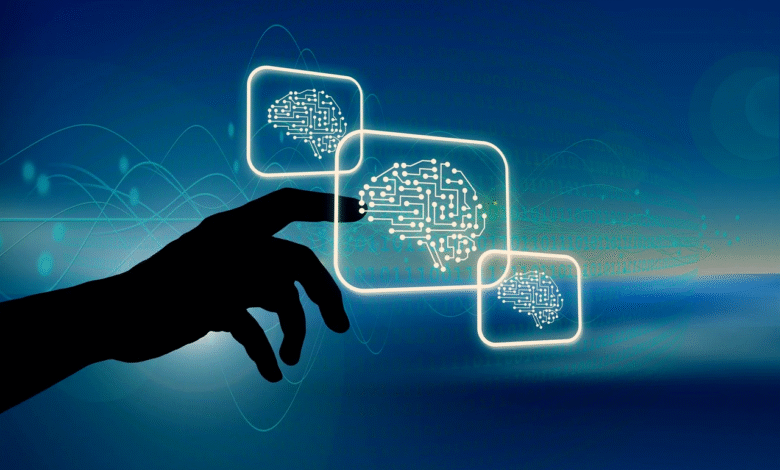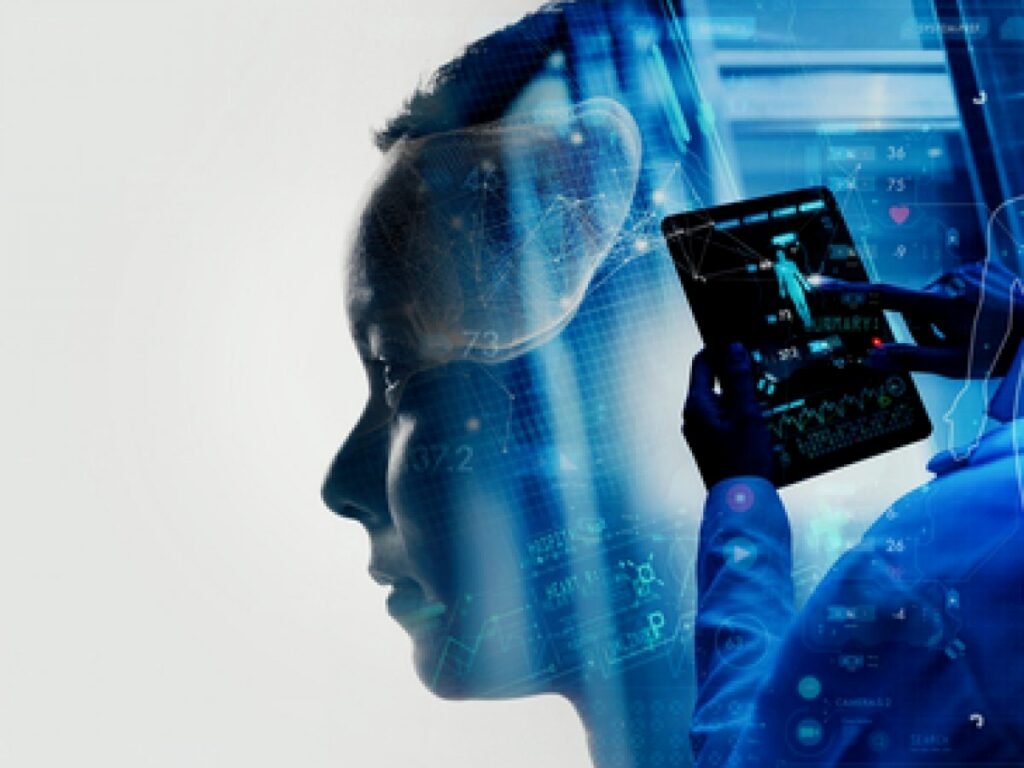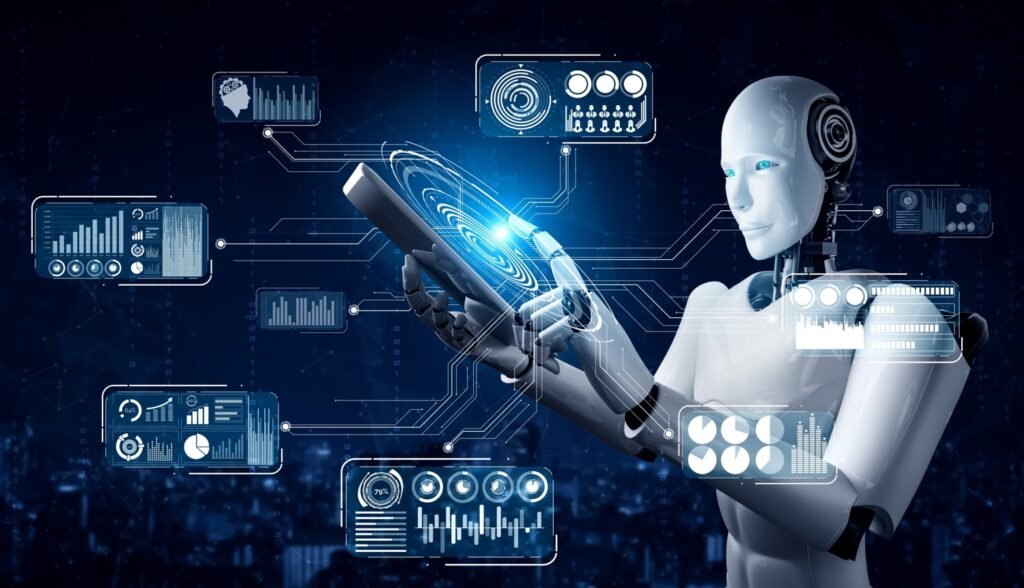
In the dynamic landscape of technological innovation, Artificial Intelligence (AI) has emerged as a revolutionary force, reshaping industries and redefining the way we interact with the digital world. Understanding the latest breakthroughs in AI is not only fascinating but also essential for individuals and businesses looking to stay ahead in the ever-evolving technological curve.
Read More: Conversational vs Generative AI
Evolution of AI Technology

Historical Overview
The roots of AI can be traced back to the mid-20th century, with early endeavors focused on creating machines that could simulate human intelligence. The 1950s witnessed the development of the first artificial neural network, laying the foundation for subsequent breakthroughs. Over the decades, AI has undergone a remarkable evolution, transitioning from rule-based systems to the sophisticated machine learning algorithms we see today.
Milestones in AI Development
Key milestones include the development of expert systems in the 1970s, the emergence of symbolic reasoning in the 1980s, and the resurgence of neural networks in the 21st century. Each era brought new possibilities and challenges, contributing to the rich tapestry of AI’s journey.
Current State of AI Technology
Machine Learning Advancements
At the heart of AI’s current capabilities lies machine learning, a paradigm where algorithms learn from data to improve their performance over time. This has led to breakthroughs in predictive analytics, allowing machines to make accurate predictions and recommendations based on patterns identified in vast datasets.
Deep Learning and Neural Networks
The advent of deep learning, inspired by the structure and function of the human brain, has propelled AI into realms previously considered unattainable. Complex neural networks, capable of processing intricate information, have significantly improved tasks such as image and speech recognition.
Natural Language Processing (NLP)
Natural Language Processing is another frontier where AI has made substantial strides. Machines can now understand and generate human-like language, facilitating advancements in virtual assistants, chatbots, and language translation tools.
Applications of AI
Healthcare
AI’s impact on healthcare is transformative. From diagnostic tools that analyze medical images to predictive algorithms that help identify potential health risks, AI is enhancing patient care and streamlining medical processes.
Finance
In the financial sector, AI algorithms analyze market trends, optimize investment portfolios, and detect fraudulent activities. This not only enhances decision-making processes but also contributes to the efficiency and security of financial systems.
Autonomous Vehicles
The development of autonomous vehicles showcases AI’s potential to revolutionize transportation. Machine learning algorithms enable cars to navigate, perceive their environment, and make real-time decisions, contributing to the advancement of smart transportation systems.
Entertainment
Entertainment has not been left untouched by AI. From personalized content recommendations on streaming platforms to AI-generated music and art, the industry benefits from AI’s ability to understand and cater to individual preferences.
AI in Business
Automation and Efficiency
Businesses are increasingly leveraging AI for process automation. Routine and repetitive tasks are streamlined, leading to increased operational efficiency and cost savings. This, in turn, allows employees to focus on more strategic and creative aspects of their work.
Customer Service Improvements
AI-powered chatbots and virtual assistants are transforming customer service. These intelligent systems provide instant support, answer queries, and resolve issues, leading to improved customer satisfaction and loyalty.
Challenges in AI Development
Ethical Concerns
As AI becomes an integral part of our daily lives, ethical concerns come to the forefront. Issues such as bias in algorithms, invasion of privacy, and the potential misuse of AI technology demand careful consideration and the establishment of ethical guidelines.
Bias in AI Algorithms
One of the critical challenges is the inherent bias in AI algorithms, often stemming from biased training data. Addressing this issue is crucial to ensure fair and unbiased AI applications.
Future Trends in AI

Quantum Computing Integration
The integration of quantum computing with AI holds tremendous promise. Quantum computing’s ability to process information at speeds unimaginable by classical computers could lead to breakthroughs in scientific research, cryptography, and optimization.
AI and the Internet of Things (IoT)
The synergy between AI and the Internet of Things is poised to create intelligent, interconnected systems. From smart homes to industrial processes, this collaboration enhances automation and decision-making, ushering in a new era of efficiency.
Impact on Jobs
Job Displacement
The rise of AI automation has sparked concerns about job displacement. Certain routine tasks may be automated, potentially leading to a shift in the job market.
New Opportunities
Simultaneously, the AI revolution creates new opportunities. Emerging fields related to AI development, maintenance, and oversight present avenues for individuals to explore diverse and dynamic career paths.
AI Ethics and Regulations
Importance of Ethical AI
Ensuring the ethical development of AI is crucial. Responsible AI practices are essential to building public trust and minimizing potential harm.
Global Regulations
Recognizing the global impact of AI, efforts are underway to establish cohesive regulations. International collaboration is essential to address ethical, legal, and societal challenges associated with AI.
AI in Everyday Life
Virtual Assistants
AI-powered virtual assistants, such as Siri, Alexa, and Google Assistant, have become integral parts of everyday life. They assist with tasks, answer queries, and control smart devices, simplifying daily routines.
Smart Homes
The integration of AI in smart homes enhances convenience, energy efficiency, and security. Interconnected devices respond intelligently to user preferences, creating a seamless and personalized living environment.
Key Players in AI
Leading Companies
Tech giants like Google, Microsoft, and IBM lead the charge in AI research and development. Their investments and innovations drive the industry forward, setting benchmarks for others to follow.
Innovations by Startups
The AI landscape is not confined to established players. Startups contribute significantly, bringing fresh ideas and breakthrough innovations. Their agility and creativity foster a dynamic and competitive AI ecosystem.
AI and Creativity
AI in Art and Music
AI algorithms are now involved in creating art, composing music, and even writing literature. Collaborations between AI and human creators showcase the potential for AI to enhance and complement human creativity.
Collaborations with Humans
Rather than replacing human creativity, AI collaborates with it. Joint projects between AI and human creators result in novel expressions and discoveries, expanding the boundaries of what is possible.
The Role of AI in Research
Scientific Discoveries
AI accelerates scientific research by analyzing massive datasets, simulating experiments, and identifying patterns. This contributes to groundbreaking discoveries in various scientific fields, from physics to biology.
Drug Development
In the pharmaceutical industry, AI plays a vital role in drug discovery. Predictive algorithms help identify potential drug candidates, optimize molecular structures, and expedite the development process.
Public Perception of AI

Misconceptions
Addressing misconceptions about AI is crucial. Common fears, such as machines surpassing human intelligence or taking over jobs entirely, need to be balanced with a realistic understanding of AI’s capabilities and limitations.
Building Trust Transparency
explainability and responsible use of AI are vital for building trust. Open communication about the benefits and risks of AI fosters understanding and acceptance among the general public.
Read More: How the Manufacturing Industry Became More Digital
The Final Words
The latest breakthroughs in AI technology mark a paradigm shift in how we perceive and interact with the digital realm. From transforming industries to influencing creative endeavors, AI’s impact is profound and far-reaching. As we navigate the complexities and challenges posed by AI, it is imperative to prioritize ethical considerations and work collectively towards a future where AI serves as a force for positive change, benefiting humanity as a whole.








2 Comments